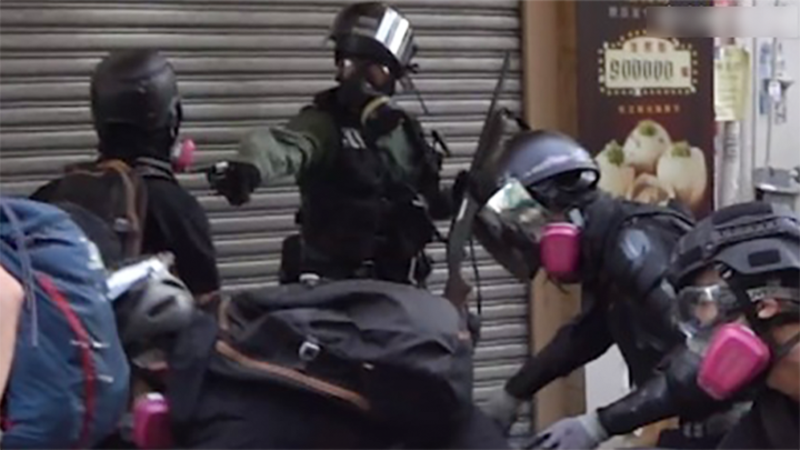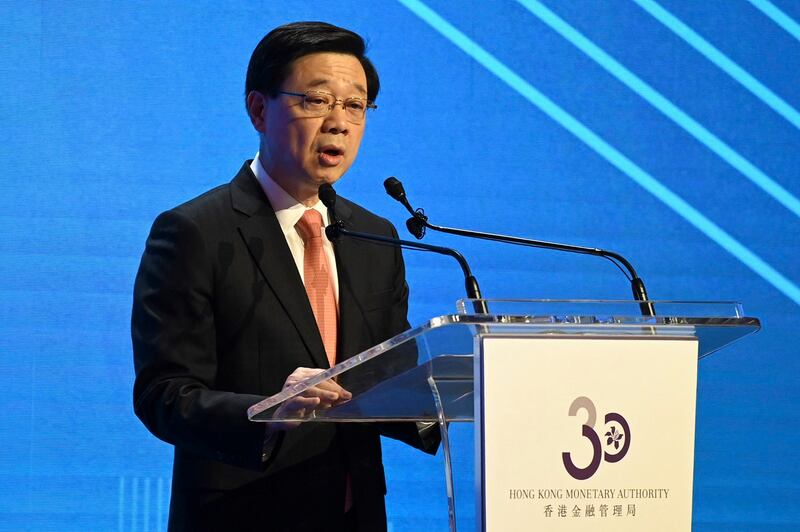A protester who was jailed for "rioting" after being shot in the chest by police during the 2019 protest movement has appeared in a mainland Chinese-style televised "confession," as part of a series of propaganda films made by the Hong Kong police in praise of a draconian security law.
"The atmosphere back then seemed to be getting more and more intense," Tsang Chi-kin, who is currently serving a 47-month jail term, is heard saying as his shadow is seen against a backdrop of footage from the 2019 protests.
"So when I saw everyone else taking part, I just got more and more deeply involved," says Tsang in a video published recently to the website of Hong Kong broadcaster TVB.
A voice-over then describes Tsang as having started out joining peaceful street protests, then meeting other protesters who gave him "equipment."
"Pretty soon, going to illegal gatherings became a habit," the narrator intones.
The video series comes amid a citywide crackdown on political opposition and public criticism of the authorities under the National Security Law, which Beijing imposed on Hong Kong in 2020 in response to the 2019 protest movement.
The overseas-based Committee for Freedom in Hong Kong Foundation slammed the video as a form of "televised confession" favored by the ruling Chinese Communist Party (CCP) in mainland China.
"The weight of his sentence wasn't enough; the #CCP forced him to publicly "confess" on #TV to his 'crime,' the group said via its X account, adding: "This is a disgraceful move for #HK which claims to be a free city."

Former Washington Post Hong Kong correspondent Shibani Mahtani, who co-authored a book about the Hong Kong protest movement, tweeted: "Tsang Chi-kin was shot, tried to seek asylum and protection from the U.S. consulate in Hong Kong, spent two years hiding in safe houses and transported from place to place in boxes, was sentenced to nearly four years – as if that wasn't enough, now he's "confessing" on TV."
"The line between victim and perpetrator so intentionally blurred by authorities now," she wrote.
Tsang was just 18 when he was shot by a police officer on Oct. 1, 2019, during protests marking the 70th anniversary of Chinese Communist Party rule.
He was handed a 40-month jail sentence for "rioting" and a seven-month sentence for "assaulting a police officer" despite being armed with nothing but a flimsy plastic rod.
Tsang, now 22, was also handed an 11-month sentence for "perverting the course of justice," but also received a 35% sentence deduction for expressing remorse, and for actively assisting the police in their investigations, Deputy District Judge Ada Yim told the district court at his sentencing hearing.
Later in the video, Tsang is seen facing the camera but with his face in shadow, describing the privations of his two years on the run.
"When it was time to move hiding places, I had to hide inside cardboard boxes, so people could treat me like I was goods," he said.
Arrangements were made to smuggle Tsang out of Hong Kong by boat via Pak Tam Chong, at which point he was caught and arrested, according to the video.
"I have learned to manage my emotions, to think clearly before acting, and to avoid being incited and instigated by others," he says in the video. "At the end of the day, it's me and my family who have to bear the consequences."
Former 1989 Tiananmen protest activist and current affairs commentator Ji Feng said Hong Kong seems to be adopting the televised "confessions" favored by authorities in mainland China, amid an ongoing crackdown on public dissent under the National Security Law.
"They are trying to set him up as a typical example of a protester," Ji said. "The two crimes he was found guilty of are very serious, and should carry a sentence of seven ... even eight years, no problem."
"This televised confession must have been one of the conditions of his lighter sentence."

Ji said Tsang's case is being used by the authorities to score a propaganda point, and likely regard it as a form of public "education."
He said the confession was likely produced as a warning following the announcement from former student protest leader Agnes Chow that she has skipped bail and is now in Canada.
"[This is a warning] that if you are unrepentant, like Agnes Chow, you could be severely punished," Ji said.
The Chinese and Hong Kong governments have blamed recent waves of mass protest in Hong Kong on incitement by " hostile foreign forces" seeking to foment a "color revolution" in the city.
In August, security chief Chris Tang blamed the mass protest campaign in 2012 by students – including Agnes Chow – against patriotic education in Hong Kong's schools, the 2014 Occupy Central movement for fully democratic elections, the 2016 localist-linked " fishball revolution" in Mong Kok and the 2019 protests against extradition to mainland China on the actions of "foreign forces."
Hong Kong leader John Lee vowed in October to " eradicate the causes of dissent" in the city, which he said still linger despite a years-long crackdown, adding that his administration is currently drafting new national security legislation to be passed in 2024.
Former pro-democracy district councilor Sam Yip, who is now studying in Tokyo, said Tsang has become a symbol for the protest movement, but not in the way the police perhaps intended.
"We all call him Kinjai," Yip said, using an affectionate nickname for Tsang. "He was one of the few people to be shot with live ammunition by the Hong Kong police, and the bullet went very close to his heart."
Yip said of the video: "It's partly about trying to intimidate Hong Kongers, and partly about putting the finishing touches to their own narrative, which they will keep on telling to the next generation and to people in mainland China, to stop them from trying to join Hong Kong on the road to democracy."
Translated by Luisetta Mudie . Edited by Eugene Whong.
